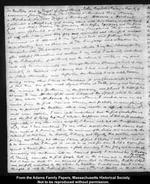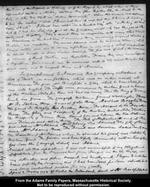Walked round the Town to see the Parliament which was sitting, where We heard but understood not the Counsel, then to see the Council and chamber of Commerce. Then We went round to the Ship Yards, made many Visits, dined at the Hotel D'Angleterre, visited the Custom house, the Post Office, the Chatteau Trompette a famous Fortification of Vaubans and its Commandant. Then visited the Premier President of the Parliament of Bourdeaux. Here I met a reception that was not only polite and
respectfull but really tender and seemingly affectionate. He asked Permission to embrace me A la francaise. He said he had long felt for me an Affection resembling that of a Brother. He had pitied me and trembled for me, and was cordially rejoiced to see me. He could not avoid sympathizing with every sincere friend of Liberty in the World. He knew that I had gone through many dangers and Sufferings in the cause of Liberty, and had felt for me in them All. He had reason he said to feel for the Sufferers in the Cause of Liberty, because he had suffered many Years in that cause himself. He had been banished for cooperating with Mr. Malsherbs, and the other Courts and Parliaments of the Kingdom in the time of Louis the fifteenth, for their Remonstrances against the arbitrary Conduct and pernicious Edicts of the Court &c. He envied the Count de Viralade his Son the pleasure, that he intended himself by accompanying me that Evening to the Commedy. But the Parliament was sitting and the press of Business rendered it impossible. Otherwise he should certainly attend me himself. Mr. Bondfield had to interpret all this Effusion of Compliments and I thought it never would come to an End. But it did and I concluded upon the whole there was a fund of Sincerity in it decorated and almost suffocated with French Compliments. Then We went to the Coffee House, then to the Comedie where We saw the two Misers (Les deux Avares). After which We supped with Messieurs Reuilles
[Recul s] De Basmarein and Raimbeaux. Here I expected nothing but a common Supper and a small Company; but found myself much disappointed. Among many others in a large Company of both Sexes, were the Count de Viralade, the eldest Son of the first President whom I had just visited. Le Moine, the first Commissary of the Navy, Le Moine his Son a Commissary of the Navy. Cornie a Captain
Page 2
in the Navy and a Knight of Saint Louis. John Baptiste Nairac, a Deputy of commerce from
LaRochelle. Paul Nairac a Merchant.Elisee Nairac a Merchant. La Tour Feger a Merchant; Menoire a Merchant, Conturier a Merchant, and many others with their Ladies; and Mr. Bondfield and Major Fraser. The Company their dresses, Equipages, and the furniture were splendid and the Supper very sumptuous. The Conversation at and after Supper was very gay,
and animated,
andchearfull and good humoured as it appeared to my Eyes and Ears and feelings but my Understanding had no Share in it. The Language was altogether incomprehensible. The Company were more attentive to me, then I desired; for they often addressed Observations and questions to me, which I could only understand by the Interpretation of Mr. Bond
[Bondfield], and the returns of civility on my part could only be communicated
[to] me through the same Channel, a kind of conviviality so
t dious and irksome, that I had much rather have remained in silent Observation and Reflection. One Anecdote I will relate, because among many others I heard in Bourdeaux it was Characteristic of the manners at that time. One of the most elegant Ladies at Table, young and handsome,
tho married to a Gentleman in the Company, was pleased to Address her discourse to me. Mr. Bondfield must interpret the Speech which he did in these Words "
Mr. Adams, by your Name I conclude you are descended from the first Man and Woman, and probably in your family may be preserved the tradition which may resolve a difficulty which I could never explain. I never could understand how the first Couple found out the Art of lying together?" Whether her phrase was L'Art de se coucher ensemble, or any other more energetic, I know not, but Mr. Bondfield rendered it by that I have mentioned. To me, whose Acquaintance with Women had been confined to America, where the manners of the Ladies were universally characterised at that time by Modesty, Delicacy and Dignity, this question was
surprizing and shocking: but although I believe at first I blushed, I was determined not to be disconcerted. I thought it would be as well for once to set a brazen face against a brazen face and answer a fool according to her folly, and accordingly composing my countenance into an Ironical Gravity I answered her "Madame My Family resembles the first Couple both in the name and in their frailties
so much that I have no doubt We are descended from that in Paradise. But the Subject was perfectly understood by Us, whether by tradition I could not tell: I rather thought it was by Instinct, for there was a Physical quality in Us resembling
Page 3
the Power of
the Magnet Electricity or of the Magnet, by which when a Pair approached within a striking distance they flew together like the Needle to the Pole or like two Objects in electric Experiments." When this Answer was explained to her, she replied "Well I know not how it was, but this I know it is a very happy Shock." I should have added "in a
lawfull Way" after "a striking distance," but if I had her Ladyship and all the Company would only have thought it Pedantry and
Bigottry. This
is a decent Story in comparison with many which I heard in Bourdeaux, in the short time I remained there, concerning married Ladies of Fashion and reputation. The decided Advances made by married Women, which I heard related, gave rise to many reflections in my mind which may perhaps be detailed hereafter on some similar Occasions. The first was if such a
[are] the manners of Women of Rank, Fashion and Reputation
[in] France, they can never support a Republican Government nor be reconciled with it. We must therefore take great care not to import them into America.
In Compliment to America this Company introduced a List of Toasts in our fashion which was an entire novelty at Bourdeaux. They gave Mr. Bondfield a Copy which he translated for me into English. The Toasts were announced by thirteen Guns in honor of the thirteen States, for then We had no more. Then the King of France twenty one Guns. The Congress, thirteen. General Washington Three. Mr. De Sartine, three. General Gates three. Marshall Broglie Three. The Count De Broglie his Brother, three. The Marquis de La Fayette three. The Glory and Prosperity of the thirteen United States, Thirteen. The Prosperity of France three. Eternal Concord between the two Nations now Friends and Allies, three. The State of Massachusetts and its Representative Mr. Adams. Mr. D'Estaing Vice Admiral. The City of Bourdeaux. Mrs. Adams three. The French and American Ladies Twenty one. The Departure of Mr. Adams when he ascended his Coach, was saluted by thirteen Guns. The Garden was beautifully illuminated, with an Inscription God Save the Congress, Liberty and Adams.
